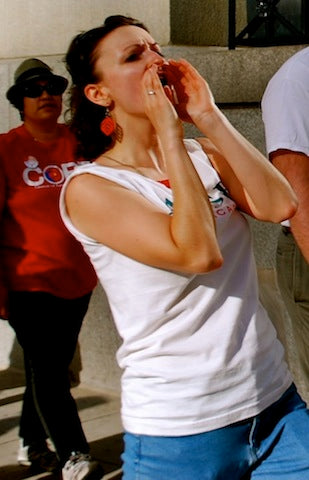Meet Shelly Ruzicka, passionate fighter for worker rights, Director of Operations at Arise Chicago, and new Co-chair of the Board of Chicago Fair Trade.

Shelly is also a long-time Mata customer. Yep, those are some old Mata ‘fan’ earrings she’s wearing. I sat down with Shelly on the ‘el’ ride home from a recent CFT board meeting:
Can you tell me a little about your work at ARISE? What are some of the projects the organization is currently working on?
Arise Chicago is an interfaith workers’ rights organization, founded in 1991, to organize the religious community in support of workers trying to form unions or win fair contracts. In 2002, we opened a worker center for non-union, mostly immigrant workers who work in the lowest paid, least regulated industries, and who regularly face wage theft, discrimination, and unhealthy or unsafe work environments. Since then, we’ve partnered with and organized about 3,000 low-wage workers to recover over $5 million in unpaid wages and compensation!
We’re working on a lot of exciting campaigns right now. One of our biggest is organizing car wash workers across Chicago. A recent University of Illinois study found that essentially no car washes in the city fully comply with employment and labor laws. The average Chicago car wash worker loses over $4,000 a year in stolen wages, over 80% aren’t given any personal protective gear (like gloves or eye protection), and 60% do not have access to clean, free drinking water. We’re working with the United Steelworkers to teach workers their rights, including the right to organize to improve conditions.

We’re also working in partnership with the Chicago Teachers Union, religious leaders, and several community groups to stop the massive school closings. The Board of Education is actually voting this week on which of the 54 proposed schools will indeed be closed. We’ve heard that 4 schools were taken off the list, but are hoping that number grows. We’ve been participating in the marches and rallies over the past several months, including a 3-day march this past weekend. A school closing this massive will mean hundreds of teachers, janitors, and cafeteria workers will lose their jobs, many families will lose the only stable institution in their neighborhoods, and students will be put at risk of violence when they have to cross gang lines to get to their new schools.
Editor’s Note: The Chicago School Board voted to close 50 public schools today.

You’ve been wearing Mata Traders for a long time. How did you first find us? What is your favorite Mata piece you own?
Wow, let’s see….It must have been around 2006 or 2007, one of my first years in Chicago. I met Maureen at the Andersonville Summer Fest. Mata Traders had a booth at the festival, and when I saw fair trade I stopped to talk to her because I had been really involved in fair trade in college. The rest is history! I’ve been wearing Mata ever since. I just got a few new things from the 2013 spring collection, so this might change once I’ve worn them, but right now, my favorite Mata piece is a skirt I got last year (I’m forgetting the name! Tulia or Julia maybe?). It’s got a high waist band with orange designs on the band and along the bottom, and the skirt has great blue and teal. I just love the style and color!
Editor’s Note: It’s the Jula Skirt!
What do you think first sparked your passion for social justice and fair trade?
Classes in college first got me interested in global poverty and how to address its root causes, like unfair free trade agreements (NAFTA, CAFTA). I studied for a semester in Oxford my sophomore year, and that’s where I first saw student activism around these issues. That got me excited to take some action back to my own campus, and I learned more about free trade agreements and about fair trade. I started to hold events on campus to educate other students and studied the issues as much as I could. I see fair trade closely linked to my current work. Fair trade seeks to ensure that workers are fairly compensated, their health and safety protected, that they have a voice on the job—often through worker owned businesses and co-ops, like with Mata Traders. These are the same rights Arise and our worker members fight for, recovering stolen wages, winning community-employer agreements, or unionizing. As a board member at Chicago Fair Trade, it’s exciting for me to connect these issues facing global workers, whether across the globe in India or right here in Chicago.


Vintage Leaf earrings (on left) and Ikat Mod dress (right)
